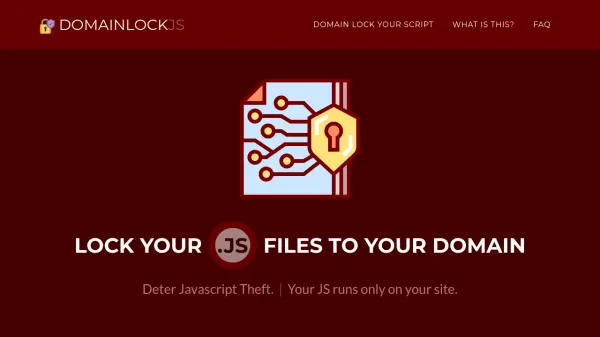What is DomainLockJS?
DomainLockJS offers a free and simple solution for website owners seeking to secure their JavaScript files. By generating a customized snippet based on your domain, this tool ensures that your JavaScript code executes only on your authorized website. If the script is used on an unauthorized domain, it intentionally triggers hard-to-diagnose errors, making theft and unlicensed use more difficult for potential abusers.
While not a full-proof method, DomainLockJS acts as a strong deterrent against casual code theft due to its lightweight design and ease of integration. Users only need to enter their website address and insert the generated snippet into their JavaScript files to benefit from enhanced script security.
Features
- Custom Snippet Generation: Generates a secure code snippet based on your domain name
- Domain-Based Locking: Restricts JavaScript file execution to authorized domains only
- Theft Deterrence: Makes script theft and unlicensed use more difficult
- Error Generation on Unauthorized Use: Triggers hard-to-trace JavaScript errors on unauthorized domains
- Lightweight Integration: Easy to insert into existing JavaScript files
Use Cases
- Preventing unauthorized use of your JavaScript files on other websites
- Adding a layer of security to public-facing JavaScript projects
- Deterring casual code theft and reducing unlicensed distribution
- Restricting bespoke or premium JS features to specific client domains
FAQs
-
Is DomainLockJS a foolproof way to protect my JavaScript files?
No, since it relies on JavaScript, persistent attackers can circumvent it, but it serves as an effective deterrent for casual code theft. -
How do I use DomainLockJS with my website?
Simply enter your website domain to generate a unique code snippet and paste it into your JavaScript files. -
What happens if my JavaScript file is used on an unauthorized domain?
It will generate hard-to-trace JavaScript errors in unrelated functions, making unauthorized use challenging.
Related Queries
Helpful for people in the following professions
DomainLockJS Uptime Monitor
Average Uptime
99.85%
Average Response Time
106.7 ms
Featured Tools
Join Our Newsletter
Stay updated with the latest AI tools, news, and offers by subscribing to our weekly newsletter.






